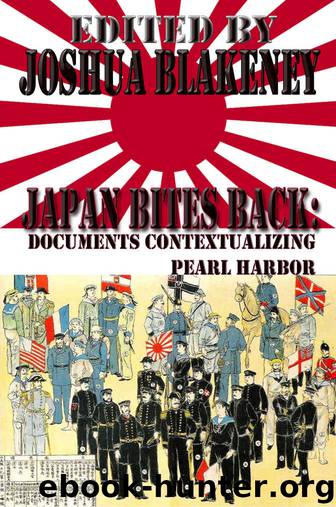Japan Bites Back by Blakeney Joshua

Author:Blakeney, Joshua
Language: eng
Format: epub
Publisher: Non-Aligned Media
Published: 2015-01-31T16:00:00+00:00
THE ANGLO-AMERICAN COMMON FRONT
Kumataro Honda
Contemporary Japan: A Review of Far Eastern Affairs VOL. IX NO.II
Originally Published: November, 1940
Since hostilities broke out between Japan and China in July, 1937, the writer has seized every opportunity to bring home to the Japanese nation the important fact that not only the Soviet Union, but Great Britain and the United States as well stand behind China, for both Britain and America are perfectly united, so far as the China affair is concerned.
Unsophisticated Japanese have a partiality for wishful thinking in international politics, though this failing is not a monopoly of the Japanese alone. A survey of the vicissitudes of relations between Japan, Great Britain and the United States since the first World War shows that Britain and America as well as Japan have fallen an easy victim to wishful thinking. The prevailing impasse in their relations has been caused by a series of incidents, punctuated with short-lived understandings. The Japanese first thought that the Soviet Union was behind China in its conflict with their country. With the development of Japanese military operations in China, however, acts of obstruction, openly committed by British authorities and nationals against the Japanese forces made Japanese people cast suspicion upon Great Britain. The armed clash between Japan and China was indeed an inevitable outcome of policies, consistently pursued by Great Britain since the latter half of 1935, or to be more exact, since the visit of Sir Robert Leith-Ross to China, which resulted in Great Britain's success in carrying out China’s currency reform to her own advantage. Great Britain regards Chiang Kai-shek as a great leader who has succeeded in unifying the so-called Republic. She desires to help China, as unified by Chiang Kai-shek, become a modern state in an effort to make it a bulwark against Japan's advance to the Asiatic continent. An implication to that effect was made by Neville Chamberlain, then Chancellor of the Exchequer, in an address, delivered in October, 1931. The assistance extended to Chiang Kai-shek is a manifestation of Britain's deep-rooted national policy, not sentimentalism or a local clash of interests.
This was not appreciated by unsophisticated Japanese. Even many persons who were engaged in politics were not aware of it. But now even unsophisticated Japanese have come to see that Britain’s anti-Japanese policy towards China is deep-rooted and at complete discord with the policy Japan is pursuing.
The Japanese may now understand the true attitude of Great Britain, so far as her China policy is concerned, but they still fail to see that both Great Britain and the United States have a common position as well as a common objective.
The American Government in its notes to the Tokyo Government has charged Japan with violations of the Nine-Power Treaty and the Anti-War Pact. As pointed out by some Japanese, America is apt to take a legalistic view of the situation, because of her lack of understanding of Far Eastern affairs. It is contended by them that heart-to-heart talks with America will eventually result in her understanding Japan's position, though Britain would seem incorrigible.
Download
This site does not store any files on its server. We only index and link to content provided by other sites. Please contact the content providers to delete copyright contents if any and email us, we'll remove relevant links or contents immediately.
| Africa | Americas |
| Arctic & Antarctica | Asia |
| Australia & Oceania | Europe |
| Middle East | Russia |
| United States | World |
| Ancient Civilizations | Military |
| Historical Study & Educational Resources |
The Tale of Genji (unabridged) by Shikibu Murasaki(1054)
Japan by Edwin Reischauer(967)
The Complete Guide to Japanese Drinks by Stephen Lyman & Chris Bunting(939)
Shogun by James Clavell(887)
Native American in the Land of the Shogun: Ranald MacDonald and the Opening of Japan by Frederik L. Schodt(835)
Japanese Notebooks by Igort(819)
The Pacific War by Robert O'Neill(809)
Japanese Candlestick Charting by Steve Nison(767)
Shogun (The Asian Saga Chronology) by James Clavell(764)
Last Mission to Tokyo by Michel Paradis(757)
Bushido Explained by Alexander Bennett(741)
The Pillow Book by Sei Shonagon(738)
Ninja Fighting Techniques by Stephen K. Hayes(727)
The Dutch Encounter with Tokugawa Japan by Adam Clulow(726)
The Great Road by Smedley Agnes;(706)
Underground: The Tokyo Gas Attack and the Japanese Psyche by Haruki Murakami(678)
Last Mission to Tokyo: The Extraordinary Story of the Doolittle Raiders and Their Final Fight for Justice by Michel Paradis(676)
People Who Eat Darkness by Richard Lloyd Parry(660)
Comfort Woman by Maria Rosa Henson(660)
